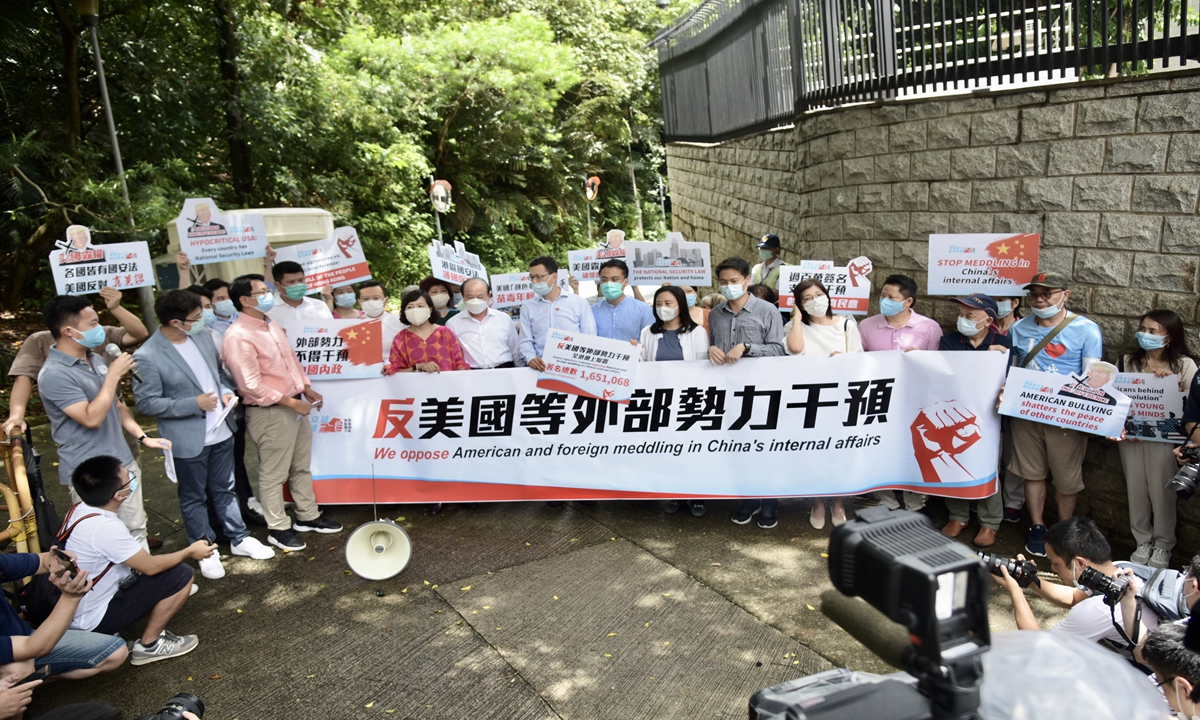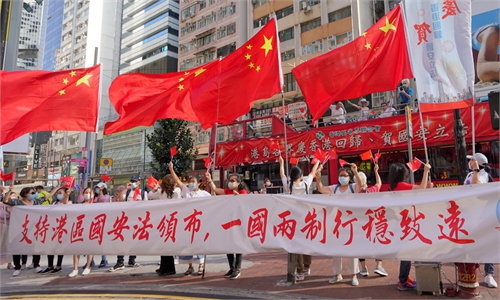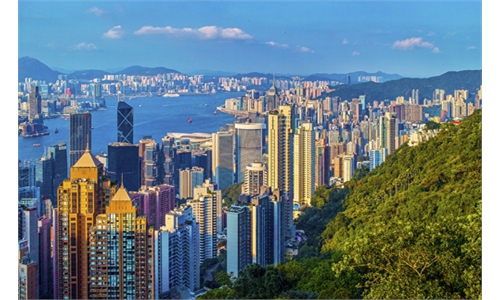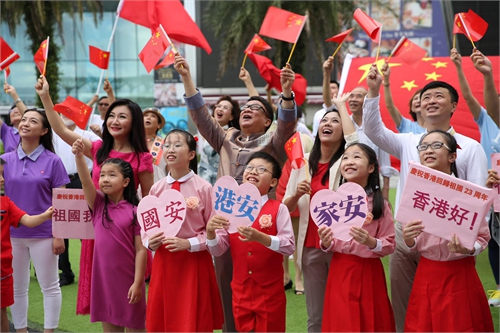Head of national security office in HK soon ‘to be announced’
Central govt agency ‘an intelligence and law enforcement body’

A group of Hong Kong residents gather outside the US Consulate General Hong Kong and Macao in Central Hong Kong to protest against US interference in China's domestic affairs and Hong Kong affairs on Thursday. Photo: cnsphoto
Government agencies newly established in accordance with the national security law for Hong Kong will soon be activated, as the secretary-general for the national security committee in Hong Kong has been appointed, and observers said that the head of the central government's national security office in Hong Kong will also be announced very soon, as the need for law enforcement is urgent.
The new office with high authority will work with existing central government institutions, including the central government liaison office and the foreign ministry commissioner's office, as well as the People's Liberation Army (PLA) Garrison in Hong Kong, to jointly safeguard national security through intelligence sharing and analysis, experts said.
The State Council, China's cabinet, on Thursday appointed Chan Kwok-ki as secretary-general of the Committee for Safeguarding National Security of the Hong Kong Special Administrative Region (HKSAR), the Xinhua News Agency reported.
In accordance with stipulations of the Law of the People's Republic of China on Safeguarding National Security in the HKSAR, Chan was appointed upon nomination by HKSAR Chief Executive Carrie Lam, as well as the chairperson of the new committee for national security affairs in Hong Kong.
After unveiling the appointment of the secretary-general of the HKSAR committee for safeguarding national security, appointments for other officials in charge of relevant agencies would also be announced soon, as some cases have been identified as offenses under the national security law for Hong Kong, and authorities would also advance future work, Tam Yiu-chung, an NPC standing committee member from the HKSAR, told the Global Times on Thursday.
Analysts from the Chinese mainland noted that since the law was enacted two days ago, personnel and relevant agencies should be prepared as soon as possible, and the head of the Office for Safeguarding National Security of the Central People's Government in the HKSAR and the National Security Adviser of the Committee for Safeguarding National Security of the HKSAR would be announced on Friday or over the weekend.
Under the law, the Department of Justice of the HKSAR shall also establish a specialized division to prosecute offenses endangering national security and other related legal work, while the Hong Kong Police Force shall establish a department to safeguard national security with law enforcement capacity.
Tam noted that the working mechanism for the law will soon be established and finalized, which would help handle situations on a case-to-case basis.
A more powerful office
According to the new law, the central government national security office in Hong Kong shall establish a mechanism of coordinating with the Committee for Safeguarding National Security of the HKSAR, chaired by the chief executive, to oversee and provide guidance on the work of the HKSAR for safeguarding national security.
Tian Feilong, a legal expert on Hong Kong affairs at Beihang University in Beijing, said on Thursday that as the representative of the central government for national security affairs in the city, the office will oversee the committee's operations, and no institution or individual in the HKSAR can oversee the office, which means the office has the highest authority in the field of national security affairs in the city.
"Office staff shall abide by the laws of the HKSAR as well as national laws. They shall be subject to the supervision of national supervisory authorities in accordance with the law," the national security law for Hong Kong stipulates.
Li Xiaobing, an expert on Hong Kong affairs at Nankai University in Tianjin, told the Global Times on Thursday that the committee chaired by the chief executive is a decision-making and policy-making body on national security affairs of the HKSAR government, while the central government's national security office is an intelligence and law enforcement agency.
According to the law, the office staff shall be dispatched by relevant national security authorities under the central people's government. Observers noted that the staff could mainly come from the Ministry of Public Security (MPS) and the Ministry of State Security (MSS).
Coordination in HK
According to the law, the new law shall strengthen working relations and cooperation with the Liaison Office of the Central People's Government in the HKSAR, the Office of the Commissioner of the Ministry of Foreign Affairs in the HKSAR, and the Hong Kong Garrison of the Chinese PLA.
Observers said the new office will fill the gap of safeguarding national security in the HKSAR and will make the central government's governance over the city more mature and comprehensive.
Some Hong Kong media outlets predicted that the head of the office would likely be a vice minister from the MPS.
Tian said the three offices and the PLA garrison are not subject to each other, but will all be led by the central government, so their relationship would be coordinative and cooperative in nature, and they will work together in information sharing, research and analysis over specific threats or situations.
Li Xiaobing said, "Foreign affairs, national defense and national security are in the hands of the central government, and cooperation among these three central government offices in the HKSAR as well as the PLA garrison would be a nightmare for foreign forces."
That's why some politicians and officials of Western countries, especially the US, are getting nervous, and Western media and some local Hong Kong media keep hyping the criticism of the law by saying that the central government is killing the "one country, two systems" and undermining the judicial independence of the HKSAR, Li noted.
Tian said criticism from Western politicians and some media outlets are boring as they have nothing new to say.
Most Hong Kong residents, as well as local and foreign elites doing business in the city, such as the real estate tycoons and foreign banks, do not share this criticism. They even welcome the law as it can create a stable environment for economic recovery, Tian said.
Those who are getting nervous or being groundlessly critical of the law know that they have done or are doing something that could be punishable by the new law, and some of them might not be able to think independently because of their biased and senseless mind-set.
"No need to refute them again and again," Tian said, "It's just wasting time."





